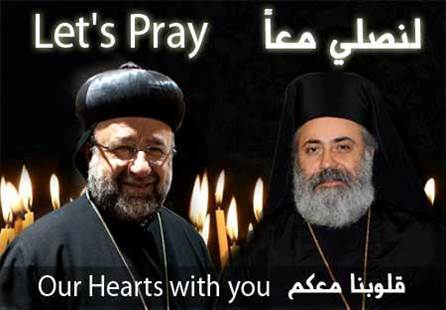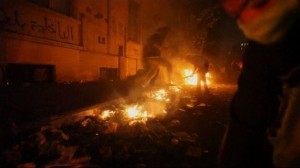
Please pray for all the people of Syria, including Greek Orthodox Bishop Boulos Yazigi and Syriac Orthodox Bishop Yohanna Ibrahim from Aleppo,
whose whereabouts are still unknown since they were kidnapped earlier this year. May the spirit of peace, justice and reconciliation fill the hearts and minds of all those in that troubled region.
An ELCA action alert today urged constituents to contact President Obama and Members of Congress to condemn the use of chemical weapons and to urge restraint and encourage non-violent means to resolve the 2-year-old civil war in Syria that has claimed 100,000 lives. The US has recently threatened the Assad regime with military strikes in retaliation for alleged chemical weapons attacks, the most recent of which killed over 1400 people. Early this week, ELCA Presiding Bishop Mark S. Hanson sent a letter to President Obama asking him to continue diplomatic efforts rather than pursuing military action in Syria. According to the statement:
The use of chemical weapons in Syria is heinous and inexcusable. These atrocities are an assault on human dignity, and violate international standards and law. However, the people of Syria, along with many others in the Middle East who are living through this time of profound instability, deserve our concern, compassion and accompaniment, not the escalation of an already horrendous war.
Write to President Obama | Write to Members of Congress
Middle East Christians Speak out Against Military Action Against Syria:
According to Middle East expert Professor Juan Cole:
…these Eastern Christians are solidly against an American missile strike on Syria. Many US congressional representatives discussing the possibility of military action against that country invoked God and prayer in their remarks, lending the discussion a Christian ambiance. But they didn’t refer to any statements on the crisis by actual Syrian or Lebanese Christians (the two are closely linked).
Read full story which references statements by the Greek Catholic Patriarch of Antioch, the Bishopric of Damascus and the Maronite Catholic Patriarch of Lebanon that warn military intervention will increase the suffering of the Syrian people.
Earlier this week, the General Secretary of the National Evangelical Synod in Syria and Lebanon sent an urgent letter to its partner church, the Presbyterian Church USA, advocating a non-violent response to chemical weapons attacks in Syria:
We urge the international powers to refrain from the use of power against Syria as any strike from the USA or any other power will only multiply the suffering and human destruction. We appeal to all who are able, by the name of the God of love, to help bring violence to an end. Stop financing, arming and sending foreign groups to fight in Syria – help the Syrians to come together to build a new Syria.
Rev. Fadi Dagher, General Secretary of the National Evangelical Synod of Syria and Lebanon
ELCJHL Bishop Munib Younan, also President of the Lutheran World Federation, issued a similar call to the world community:
While the use of chemical weapons is wrong, the forms of intervention being predicted thus far can do little to bring a positive outcome… Such military intervention threatens to bring even greater suffering and instability to communities throughout Syria and the region as a whole … The situation in Syria will be solved not with bombs but with diplomatic efforts and true dialogue among Syrians of goodwill … To choose the path of diplomacy brings the Middle East closer to the goal of peace. Such a choice is not weakness, but the sign of peace and security.
Kairos Palestine also released a statement:
The people of Syria deserve better, safer and more just lives based on more respect for their human rights – but these must be brought about, by Syrians themselves, within their own context. External intervention will cause further destruction and push the Syrian people further into relentless civil war.
Kairos Palestine condemns the calls for war, and we urge countries around the world – whether Western states or regional ones – to help Syria maintain itself, broker peace among all Syrian parties involved, and stop supporting any armed groups entering from outside the country.
Similar statements have come from:
The Lutheran World Federation
The World Council of Churches
The World Council of Reformed Churches
The National Council of Churches
The Presbyterian Church (USA)
Read religious leaders commenting on whether an attack on Syria would be considered a “just war.”
Please keep the people in Syria in your prayers, advocate for peace with justice with your faith, political and community leaders and ask that God strengthen and inspire the people who can bring justice, peace and reconciliation out of the chaos and brokenness.

